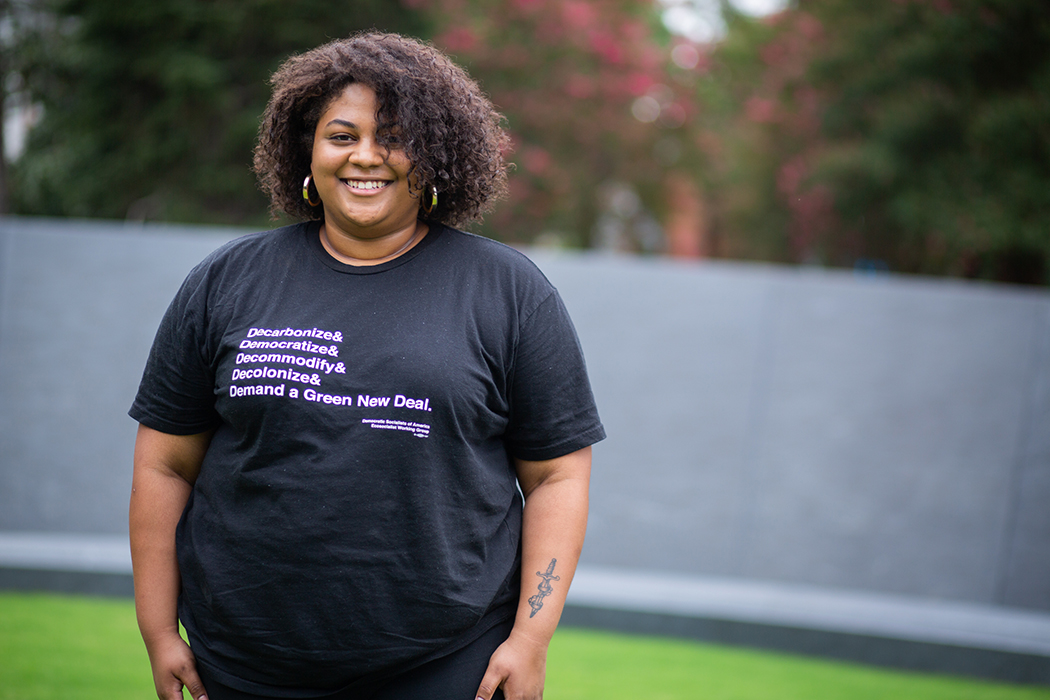This summer, UVA fourth-year Sarandon Elliott received a call from an unknown number. When she listened to the voicemail later that day, Elliott was shocked to learn who had called her: the University Police Department.
“I just had a few questions in reference to the [Young Democratic Socialists of America] and was hoping you might be able to answer them for me,” said the officer in the voicemail, identifying himself as Lieutenant Michael Blakey. “Please give me a call back.”
Since then, Elliott, co-chair of YDSA’s National Coordinating Committee, claims that UPD has tried to contact and question her several times, even after she told them she does not feel comfortable speaking with police. UPD employees have also come into the Multicultural Student Center and Latinx Student Center, and asked to set up meetings with her and other student organizers, she says.
Earlier this month, Elliott detailed her experiences in an open letter to UVA President Jim Ryan, UPD Chief Tim Longo, and the university community, demanding that the department stop “entering and occupying” spaces that are set aside for Black and brown students. UVA’s Multicultural Student Center “aim[s] to facilitate a student-centered, collaborative space that supports underrepresented and marginalized communities, while cultivating the holistic empowerment of all students,” according to its website.
“I am not publishing this to the university because I am scared—I am writing this because I am furious,” wrote Elliott. “I am Black, working-class, Queer, and a Socialist. Do you know how many people have lost their lives to police violence because they identify with one or more of these identities?”
According to Elliott, UPD’s Diversity, Equity, and Inclusion Manager Cortney Hawkins and Community Engagement Specialist Dani Lawson—who are both Black women—have sought out a meeting with her, both at a student activity fair and by coming to the MSC in person. Students say other officers, including Longo, have also visited the MSC and LSC in plain clothes.
Lawson and Hawkins declined to speak with C-VILLE, but sent a statement defending their attempts to meet with student organizers.
“University Police regularly engage with students…in order to hear their points of view on public safety issues and discuss the UPD’s efforts to maintain a safe and welcoming community on Grounds,” they wrote. “Those conversations are an essential part of developing and maintaining trust between [UPD] and the community.”
“While many individuals hold different points of view, we respect everyone’s apprehensions and willingness to work with UPD,” the officers concluded.
Lawson told The Cavalier Daily that she and Hawkins did not ask to speak specifically with Elliott, and that they talked to every student group at the fair. Elliott says she never got a direct response to her letter.
The disagreement once again reveals the depth of the rift between UVA’s minority students and the institution’s administration.
In 2006, the school arrested 17 activists after they conducted a sit-in in the president’s office to advocate for a living wage for school employees. In 2017, three student activists were also arrested for holding up a banner that read “200 years of white supremacy” at a UVA event. More recently, an article in The Intercept sparked a new round of scrutiny of Longo. While he ran the city’s police force, Longo conducted a DNA program in which his officers stopped Black men on the street at random and swabbed their cheeks to see if their DNA matched that of a serial rapist who was on the lam.
Now, student activists want nothing to do with the police, says Elliott, no ifs, ands, or buts. “[UPD] is masking it as a good faith attempt to build bridges with student organizers and find out what students want,” she says. “But myself and several other organizers have been pretty clear we have [an] abolitionist mindset.”
YDSA member Ceci Cain says she was in the Multicultural Student Center when Hawkins and Lawson came in one day, and that she spoke with them for an hour. The UPD employees asked Cain to set up a meeting with student leaders—including Elliott—and inquired about her issues with UPD and Longo. “It was mostly [Hawkins] talking,” says Cain. “She definitely gaslit me and defended Tim Longo throughout it.”
“At its core, it is a surveillance tactic to have community engagement strategies, for them to be close with students, and know who is doing what organizing,” Cain says. “[UPD] is scared of what students like Sarandon represent, which is real student power, and students with leftist philosophies getting organized.”
If the current models of policing are unsalvageable, what does safety and security look like to these students?
Moving forward, Elliott and Cain hope that UPD will stop coming into the MSC, LSC, and other spaces intended for marginalized students. The organizers also want the university to take YDSA and other organizations’ demands to defund UPD and fire Longo seriously. And they call on more students to take action and get involved in organizations, like YDSA, that work toward abolishing UPD.
In her letter, Elliott addressed the officers directly. “The day you decided to be a part of an industry rooted in white supremacy and criminalization of the multiracial working class,” she wrote, “was the day you decided your presence in those spaces were not only not welcomed but made everyone around you uncomfortable and unsafe.”

